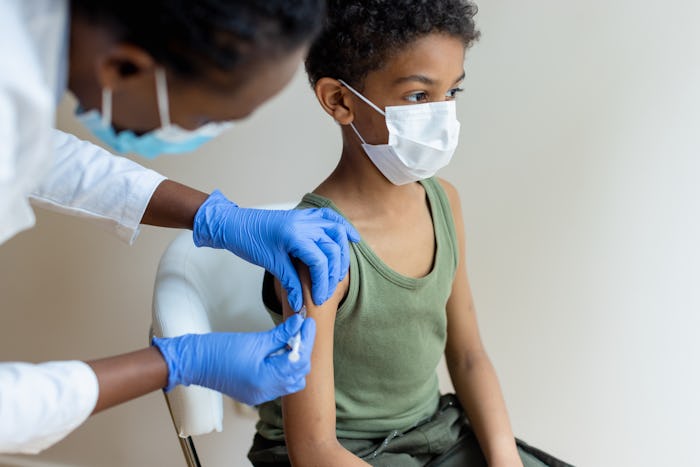Coronavirus

Survey: Just 30% Of Parents Would Get Their Kids Vaccinated Against COVID-19 Right Away
3 in 10 parents with kids between the ages of 12 and 15 said they wanted them vaccinated immediately.
A new survey from the Kaiser Family Foundation has found that a majority of parents are hesitant to have their child vaccinated against COVID-19. While Pfizer has asked the Food and Drug Administration (FDA) to expand its emergency use authorization to include children as young as 12, there are currently no COVID-19 vaccines authorized for use in children under the age of 16. But Kaiser’s survey suggests that even if a vaccine was available to children today, few parents feel would feel comfortable having their child vaccinated against the virus right away.
Only 30% of parents with at least one child between the ages of 12 and 15 said they would get their child vaccinated against COVID-19 right away, according to survey results published Thursday by the Kaiser Family Foundation’s Covid-19 Vaccine Monitor. Another 26% of parents said they would take a “wait and see” approach, effectively delaying a decision about their own child’s vaccination until more real-world information was available regarding COVID-19 vaccines and adolescents. Additionally, 18% of parents with a child between the ages of 12 and 15 said they would only have their child vaccinated if their school required it and 23% said they would “definitely” not have their child vaccinated against the virus.
Those results were fairly similar to the responses submitted by parents with at least one child between the age of 5 and 11. Among those parents, only 27% said they would have their child vaccinated right away if able while 32% said they would wait to see how the vaccine was impacting other children and 19% said they would not have their child vaccinated at all. Another 19% of parents with children aged 5 to 11 said they would only vaccinate if required to by their child’s school.
When examining parents with children under the age of 5, Kaiser found even fewer parents willing to vaccinate right away. Among those parents, only 24% said they would get their child vaccinated right away if able. That being said, parents of young children appeared more willing overall to eventually vaccinate their children with 39% telling Kaiser they would wait a while to see how vaccines were working and 23% claiming they would vaccinate if a school required it. In contrast, just 14% of parents with children under the age of 5 said they would definitely not vaccinate their children.
But vaccinating children, from toddlers to young teens, could be a vital part of helping the United States finally get control of the current coronavirus pandemic. In fact, pediatricians have said vaccinated children will likely play a keep role in the quest to hit herd immunity.
"Kids under 18 are about 20% of the nation's population,” Dr. Anthony Giordano of Pediatric Healthcare Associates told NBC News Boston. “This is going to go a long way toward getting herd immunity."
And of course, some parents, like Heather Ousley whose 13-year-old son has a rare liver disease, are thrilled to hear Pfizer’s COVID-19 vaccine could soon be authorized for children as young as 12. “This day is the best day in the history of days!!! I love this day!!!” the Associated Press reported Ousley said in a text to their reporter.
Earlier this week, President Joe Biden announced he was ready to immediately ship Pfizer COVID-19 vaccines directly to roughly 20,000 pharmacy sites and pediatricians once the FDA gave the go-ahead. "We know that adolescents are at risk from Covid-19,” Biden said Tuesday while speaking from the White Hosue. “Although serious illness at the age range is rare, they can still get sick and spread the virus to others. So my hope is that if the vaccine is authorized, parents will take advantage of it and get their kids vaccinated.”
If you think you’re showing symptoms of coronavirus, which include fever, shortness of breath, and cough, call your doctor before going to get tested. If you’re anxious about the virus’s spread in your community, visit the CDC for up-to-date information and resources, or seek out mental health support. You can find all of Romper’s parents + coronavirus coverage here.